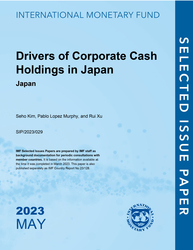
Drivers of Corporate Cash Holdings in Japan: Japan
In Japan, corporate savings have risen since 2000 in line with profits. A large share of the additional savings was kept as cash holdings (i.e., cash and short-term investments) rather than used for investment.
READ MORE...
Volume/Issue:
Volume 2023
Issue 029
Publication date: May 2023
ISBN: 9798400242243
$15.00
Add to Cart by clicking price of the language and format you'd like to purchase
Available Languages and Formats
| English |
Prices in red indicate formats that are not yet available but are forthcoming.
Topics covered in this book
This title contains information about the following subjects.
Click on a subject if you would like to see other titles with the same subjects.
Investments and Securities-General , Money and Monetary Policy , Taxation - General , International - Economics , Corporate cash holdings , Investment , intangible assets , financial frictions , tax cuts , Japan , cash holding , corporate tax tax cut , drivers of Corporate Cash Holdings , firm sample , short-term investment , Intangible capital , Corporate income tax , Effective tax rate , Tax allowances , Global
Summary
In Japan, corporate savings have risen since 2000 in line with profits. A large share of the additional savings was kept as cash holdings (i.e., cash and short-term investments) rather than used for investment. Building on a rich literature, this paper identifies two additional drivers of corporate cash holdings using financial data of public and private Japanese firms. First, a higher share of intangible capital is associated with more cash holdings. This indicates the presence of financial frictions as intangible capital is not easily collateralizable. Such financial friction could be alleviated by shifting towards cash flow-based lending that is prevalent in the United States (US). Second, corporate tax cuts are associated with more cash holdings while having no significant effect on investment. Given the significant fiscal cost, the efficiency of corporate tax cuts should be re-evaluated.
Copyright © 2010 - 2026
Powered by:
AIDC



